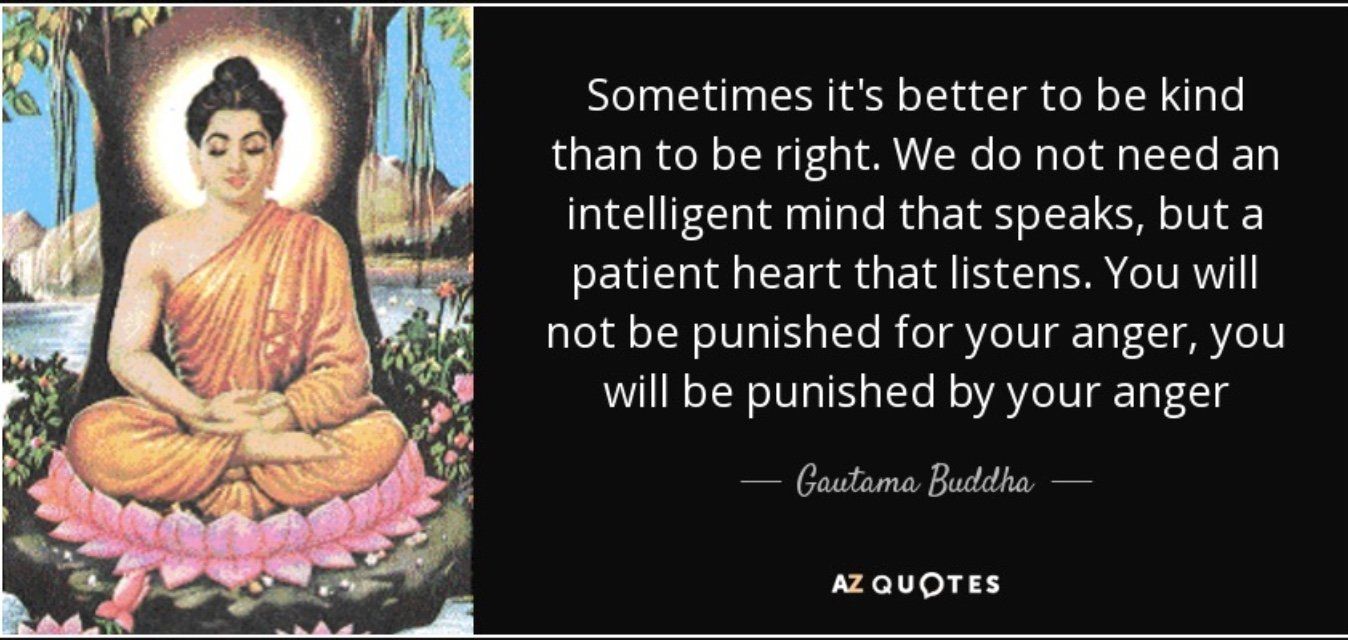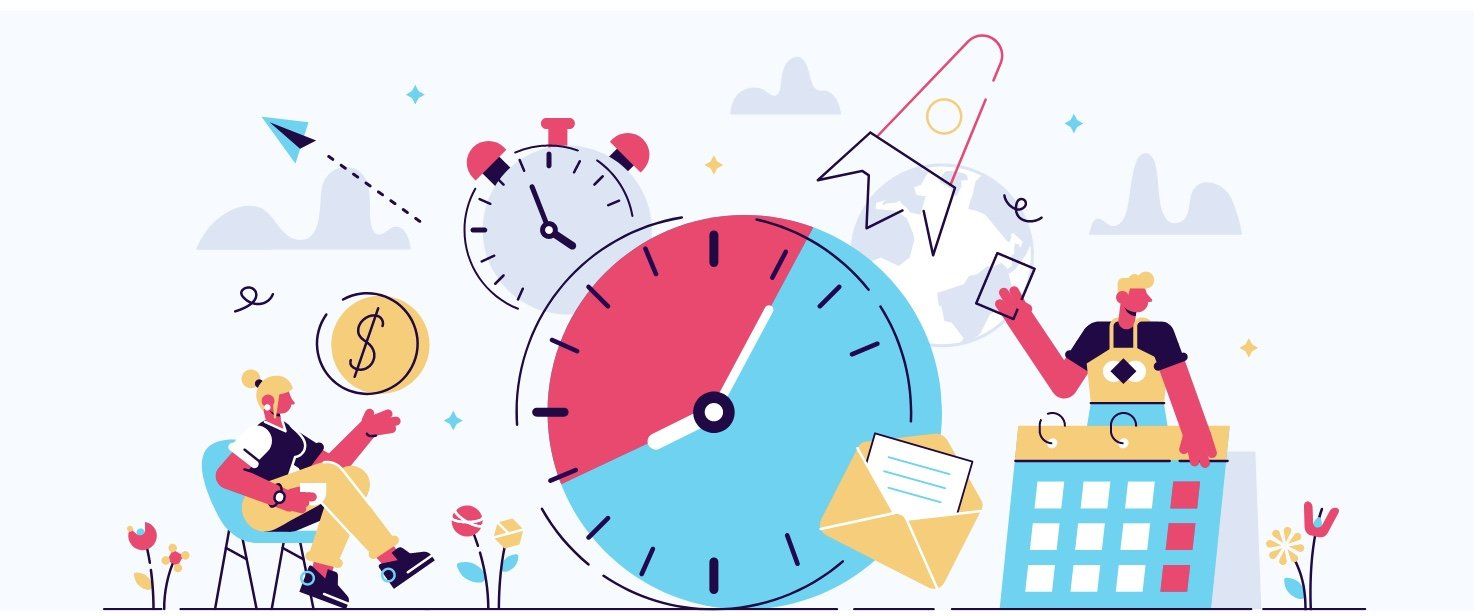

Being right was a survival strategy for me growing up. And while it may have helped me in some professional pursuits, I paid the price when it came to some of my most valued relationships.
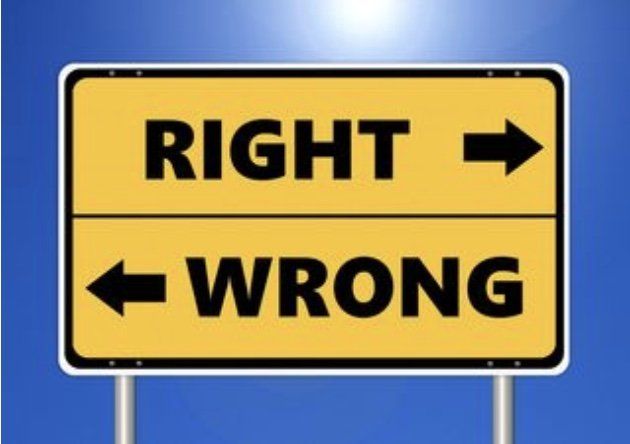
When I Realized I Was Someone Who Always Had to Be Right
A couple of years ago, I had an epiphany brought on by reading Jerry Colonna’s book,
Reboot: Leadership and the Art of Growing Up. In the second chapter, he tells the story of a co-founder who confesses that she’s a pain in the ass to work with because she always has to be right. Colonna presses her on the point by asking her why that’s the case. After a long pause, she admits that growing up, in order to avoid being crushed by her father, she
had to be right. It was the only way she felt safe. The only way she felt in control.
When I read that, I had to put the book down. My eyes began to water as I reflected on how my own need to be right had crippled numerous relationships in my life. From past working relationships to my marriage to my relationships with my siblings.
For decades, my need to be right had driven me both forward and off the edge of many cliffsides. And yet until I read
Reboot,
the need to be right was so ingrained that I was unaware of its existence, let alone its prevalence in my actions.
Looking back on my childhood, there are numerous instances when I felt attacked. My reaction was to argue vociferously in my own defense in order to block the verbal and emotional arrows shot in my direction.
In college, when people would make fun of where I came from (a small town in Indiana), I would seethe under the surface. Occasionally, I could deflect and play along, but usually, I would either fire back an aggressive remark intended to hurt, or I would swallow the bile rising in my throat, force a smile, and change the subject. Either I let the hurt fester inside me, or a lashed out and hurt someone else.
Where My Need To Be Right Came From
To understand why we are who we are today, we have to look into the past. The archeological dig of oneself is not easy. First, you have to find those places deep within yourself that have been buried within layers of emotional sediment that lithifies over time into a thick, hard layer of quartz-like armor. This armor has been built up to protect us from the accumulated memories that define us, shape us, and often direct us without us being aware of it.
In my case, all that I had buried, all of that anger, often tended to erupt in the form of rage. Like the woman in Reboot, my rage was the result of being raised by a narcissistic father. Although I have many fond and happy memories of my childhood, my father was a feared figure in our home. The words “Wait until your Dad gets home” struck terror in my heart, as I knew that soon I would be punished: spanked, grounded, yelled at, scolded. And so like the woman in the story, I too learned that in order to be safe, wrong was not an option. I needed to be right.
In order to "be right," I tried to "do right" in every arena. First by getting good grades, then by excelling at sports and winning awards at school. Later in my adult life, it manifested as taking on more and more, as I perpetually sought that “atta boy" from my father. That, “I’m proud of you son.”
But since those words seldom came, I added more to my plate: I didn't just have a major, I double majored, and added a minor, too. After college, instead of just running the family business, I also started an additional company as well. And then another. I refused to sit still, and defaulted to action, all in an attempt to impress and please my father.
As a result of this drive to impress, I never took the time to ask myself what I wanted to do. I was too afraid of doing wrong by my father. As a kid, if I was wrong or indolent, my father would lecture and berate me. I remember every year for eight years following my first football game of the season, he would tell my mother to sit in the back and put me in the passenger seat. For the next thirty minutes, I would sit there in silence as he told me that I was a pussy. That if I was going to play like that I should just quit. That I was an embarrassment. And as I sat there in silence, a little bit of me died.
The scars from events like that aren’t visible–they're deep under the surface. And because they never healed properly, it doesn’t take much to open them back up again. And so when I'm challenged, criticized, or my actions are called into question, the old operating system kicks in: my defense mechanisms go on high alert and I strike back, hard. To protect myself and end the conflict quickly by going right for the jugular.
In the wake of this behavior lies more scarring–both for myself and for those I care most about. I don't want to hurt others, but that's the result of my instinctive response to fight back as fast and furiously as I know how. Each time, I'm fighting for my own psychic life. I'm fighting to protect that scared little boy who was afraid to make a mistake and incur the wrath of his father.
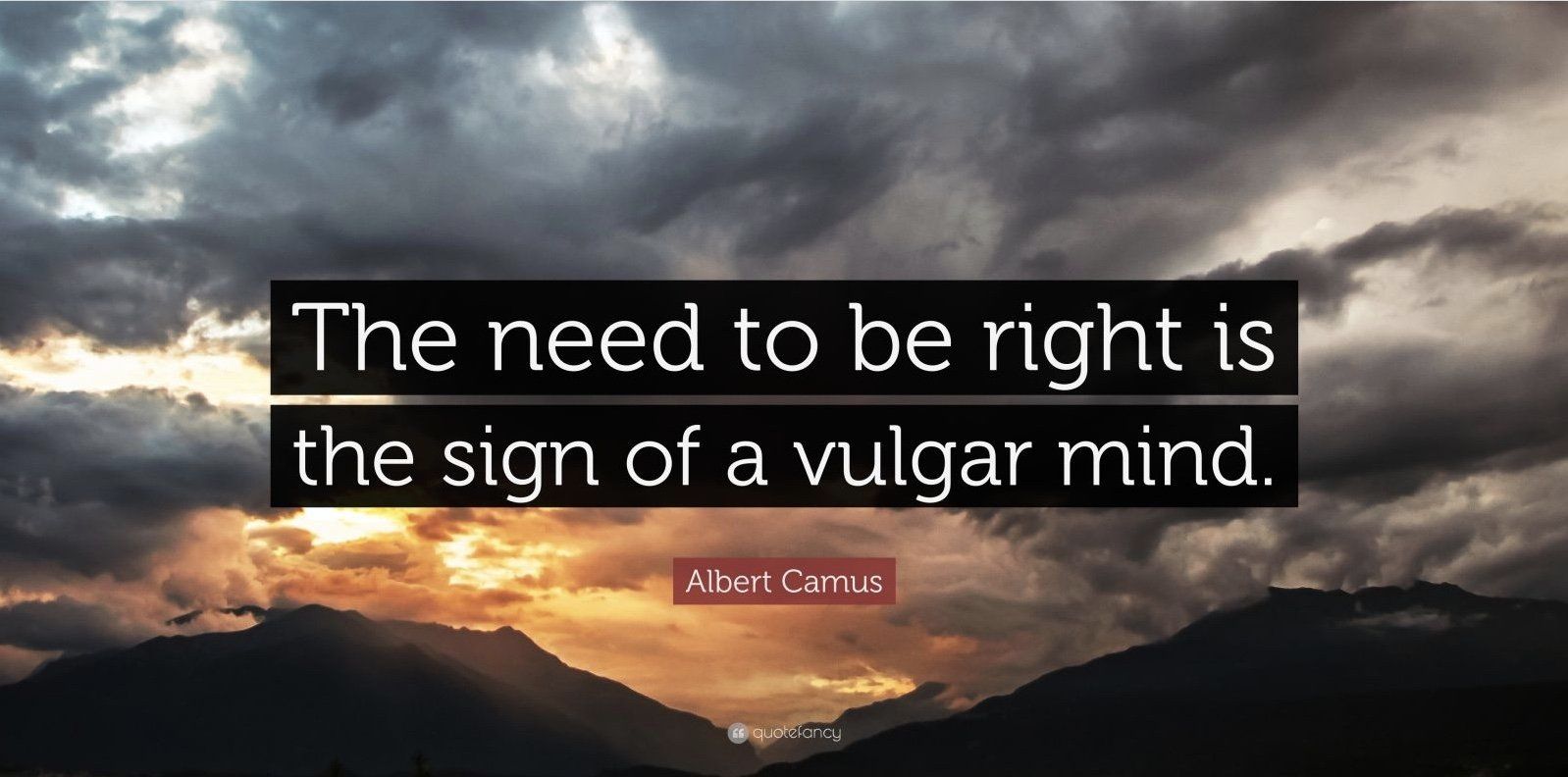
Why Do We Feel We Need to Be Right?
In the heat of battle, whether we are arguing with a loved one or engaged in a debate at work or socially, being right can feel paramount. Winning the argument can represent how we keep score for ourselves and affirm our sense of identity.
For some of us, the need to be right can begin early on in our lives. Even if you didn't have an intimidating parent like mine, you likely went through an educational system that is based largely on absolutes. In class, you’re either right or wrong and creative, non-binary answers are pushed to the side. Therefore, those that learn the binary, and memorize the right answers, get good grades. Those with good grades
get more attention from their teachers, are granted better access to all sorts of opportunities, and tend to lead more successful lives.
Moreover, being right engenders praise from teachers and parents, which intermixes with our sense of worth. The result is that many students learn to avoid being wrong and seek the safety of being right.
After years and years of being educated this way, students who graduate into their careers often struggle. In the real world, the problems that arise are nuanced, complex, and often don't have a single correct answer. Young adults who grow up being praised for answering correctly may struggle to find solutions to problems with no clear right path.
But if you become used to being right, you may find yourself doubling down in your efforts to be right, defending positions that you don't even necessarily stand by in order to protect yourself from the embarrassment of being wrong. In the workplace, this can lead to poor decision-making, dysfunctional teams, and extra work for those around you.
Additionally, the need to be right often masks our inherent anxieties and insecurities, as it is often a stand-in for our secret need to fit in and feel like we belong. If being right got us praise and accolades at home and at school growing up, while being wrong often brought shame and a sense of unworthiness, then as adults, we're going to try to avoid the latter at all costs.
For me, there were fewer things that ignited my feeling of shame than when my father said, “I’m so disappointed in you.” Those words crushed me, and so I would do anything to avoid them. Even lying seemed a far smaller price to pay than the possibility of disappointing my father.
In our efforts to compensate, we spend a lot of energy concerning ourselves with the opinions of others rather than learning to trust in ourselves.
This breeds all types of insecurities and creates a whole host of defense mechanisms to protect us from any slight or attack on our developing identities. And woe to anyone who triggers one of those defense mechanisms. Challenge us on whether we are right, we feel like we're under attack and will respond accordingly.
Now, those of us who, as students, battled to climb over one another in school in order to get good grades and win the plaudits of our parents and teachers, repeat this behavior when we start our careers. In order to compete in our winner-take-all society, many live out similar behaviors, trying to climb over our peers for promotions and acknowledgment at work. The desire to be right inflames this competitive race.
Moreover, at many companies, it’s the loudest person that comes out on top. Shouting down others and dismissing other points of view typically get the attention of the boss, especially in competitive corporate cultures like consulting, finance, and law. But, of course, these behaviors often come at the expense of personal relationships, self-awareness, and one's natural curiosity to learn and inquire.
Even though it's become common practice for companies jargon to insist that failure is embraced and celebrated, in reality, that's mostly bullshit. Being wrong is still, for the most part, seen as a weakness in the workplace. The result, like in school, is that we optimize for the test. We eliminate the potential to be wrong. We avoid risk in order to be right, or in order to be a “team player.” And both the company and the individual suffers.
By avoiding risk, we suffocate creativity and true collaboration. We spend more time covering our asses than originating creative solutions to problems. As such, some of the best talent either leaves or even worse, stays and amplifies the very dysfunction that the company is fostering.
Lastly, there’s an intellectual elitism that comes with being right. A smugness. An “I’m better than you” attitude. We see it daily in our politics where scoring points against the other side is the hallmark of our decaying and dysfunctional government. Politicians yell past each other while pressing problems are left to fester. They argue about
who is right instead of spending time figuring out
what is right. And we all suffer for it.
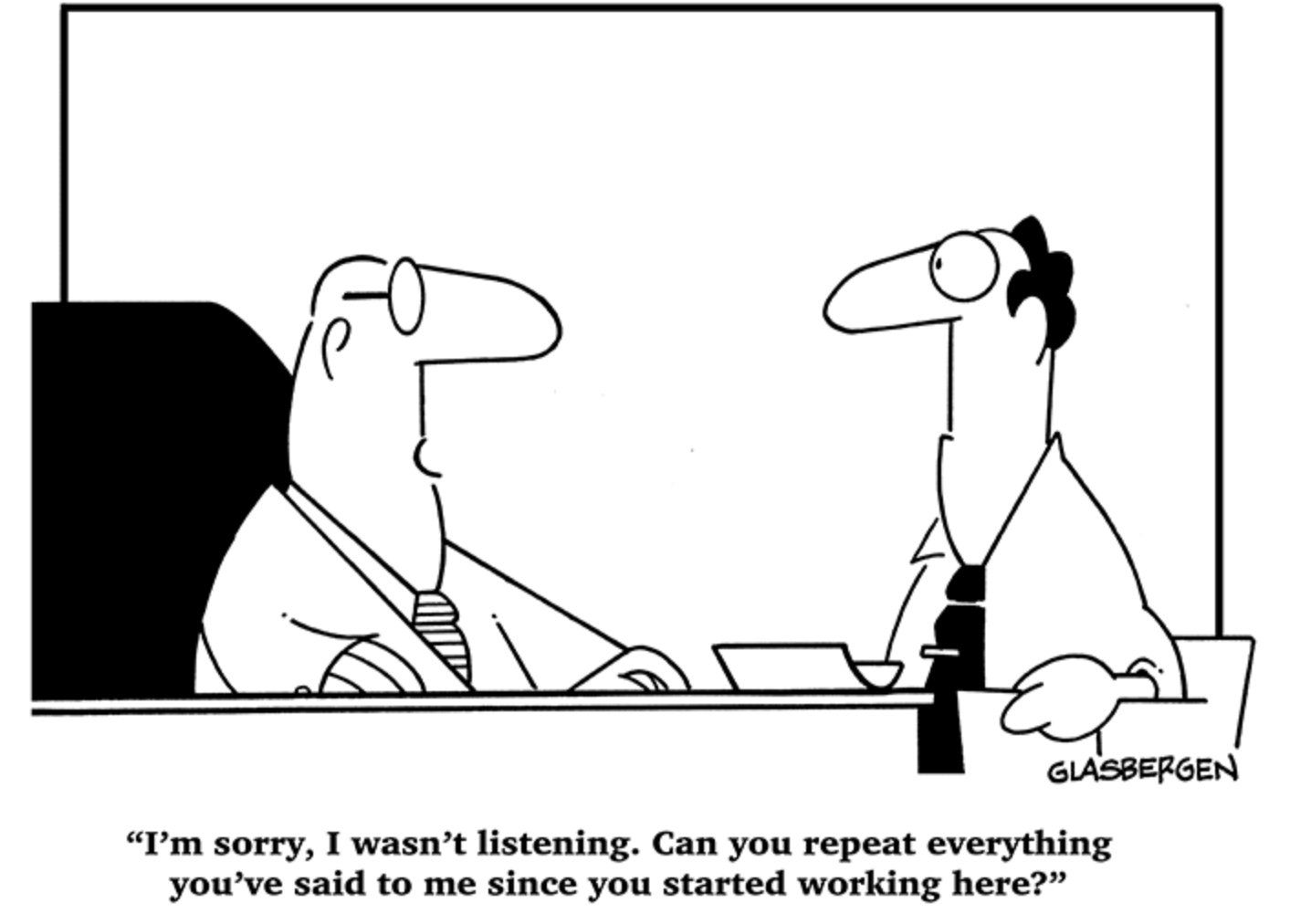
How Being Right Has Harmed Me Personally
There are so many ways that I have been harmed by needing to feel like I was in the right. For example, this need has turned me into a truly terrible listener. Often, I used to find myself only half-listening to what someone was saying, as I was more focused on picking apart the argument being presented and thinking of points I could make that would show the person just how wrong they were.
My need to be right has also meant that fights with my wife used to go on for
days. I’d dig in and start thinking about all the things she had ever done wrong in our entire relationship, arming myself for mortal combat, because inside, I felt like I was fighting for my psychic life and survival.
Similarly, fights with my siblings would drag on for weeks or months until they either saw it my way, or someone finally apologized.
At work, I'd let little problems fester. What could have easily been fixed by listening and engaging with others tended to devolve into yelling matches or extended bouts of silence. This created the very culture that I wanted to avoid–one where people were afraid to speak their minds– where they would try to hide problems instead of solving them, for fear of what I would do if I found out about the issue.
For years, I felt like my entire identity was under attack every time something I said or did was challenged. As soon as my actions or motivations were questioned, my insecurities would kick in and I would become a bully. Just like my father.
If I couldn't convince someone I was right with logic, I'd intimidate them by overwhelming them with rhetorical force and yelling. In the wake of such behavior, the people in my life would feel not only scared, but disrespected, as if I had not seen or heard them at all. Because I wasn't listening–I was lecturing. I was utterly focused on scoring points on a scoreboard that nobody cared about except me.
Instead of moving forward, I was holding on to a story I was telling myself about my past, which was full of perceived transgressions. I was constantly "keeping score" regarding how many wins I was putting up, and stewing on my missteps, instead of seeing them as opportunities for growth.
What I've Learned About My Need To Be Right
After a lot of work, I've come to see how my stubbornness and quest to be right has done far more harm in my personal and professional relationships than any success it may have created.
But as I’ve wrestled with these demons over years in therapy, in countless pages of my journal, and through my process of becoming more self-aware, I’ve begun implementing a life-changing strategy to change my ways. It's easy–anyone can do it. All it involves is shutting your mouth and opening your ears.
By listening more, I've been able to reframe feedback or criticism as information worth considering, not a personal attack. A friend of mine likes to say, “feedback is a gift.” When we truly listen to what the other person is saying, and view their words as a gift to help us improve, both parties feel seen and heard.
And in so doing, I’m beginning to heal old wounds and repair relationships.
I’ve learned that to live a full life, I must be curious above all. I must cultivate a beginner’s mindset and approach life like my triplet 7-year olds: full of questions, full of excitement, and approaching everything new as an adventure.
I’ve also learned that very few things in life are truly binary.
Rather, life is full of nuance and tradeoffs. Seldom is one person completely right or wrong. We all err, for to err is to be human. We all have blind spots in both our vision and our thinking. When we open our eyes and ears and close our mouths, we open ourselves up to possibility and serendipity. We realize that when we think instead of react, we
can solve those intractable problems. We can work together to build new things. We can heal broken relationships.
I’ve caused enough pain to myself and to others. Taking a page from my children, I’m learning to live in the moment. To be here now. To dance with whomever’s in front of me. That life isn’t about winning every argument, it’s about opening up, being vulnerable, saying “I’m sorry,” and knowing that by doing so, I could get hurt. But more importantly, I will be living a life of connection to those I care about and those I interact with.
